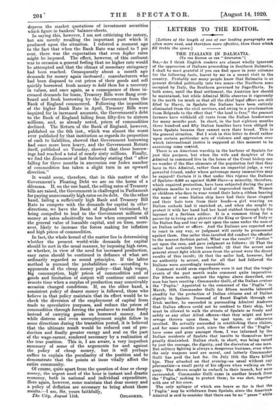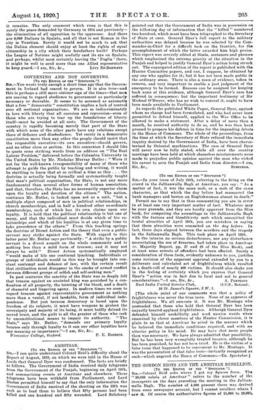LETTERS TO THE EDITOR.
[Letters of the length of one of our leading paragraphs are often more read, and therefore more effective, than those which fill treble the space.]
THE ITALIANS IN DALMATIA.
- (To THE EDITOR OP THE " SPECTATOR."1
Stn,—As I think English readers are almost wholly ignorant of the oppression of Italians proceeding in Southern Dalmatia, I shall be most grateful if you can find space in your columns for the following facts, learnt by me in a recent visit to the country. Probably not many people know that Dalmatia is at present divided politically into two zones—the Northern zone occupied by Italy, the Southern governed by Jugo-Slavia. In both zones, until the final settlement, the Austrian law should be maintained, but while Admiral Millo observes it rigorouily in the north (so much so that all the chief legal offices are still filled by Slays), in Spalato the Italians have been entirely eliminated from the civil services, and owing to a proclamation from Belgrade to the effect that " the land is free," the peasant farmers have withheld all rents from the Italian landowners for many months past. In short, in the last efghteen months three hundred and fifty Italian families have been obliged to leave Spalato because they cannot earn their bread. This is the general situation. But I wish in this letter to dwell rather upon certain particular acts of violence and aggression over which international justice is supposed at this moment to be exercising some control.
There is an American warship in the harbour of Spttlato for just this purpose, but when the wife and daughter of the Admiral in command live in the house of the Croat bishop can we wonder if the Slav elements of the population feel that they have in this Admiral, rather than an impartial judge, a. very powerful friend, under whose patronage many immunities may be enjoyed? Certain it is that under this regime the Italians of Spalato-8,000 as against 16,000 Slays—a minority, therefore, which required protection, have been subjected during the past eighteen months to every kind of unprovoked insult. Women or children who dare to wear round their hats a ribbon bearing the name of some Italian ship have had their faces slapped and their hats torn from their heads—a girl wearing an Italian cockade had it snatched at, and when she sought to protect it with her hand had her hand stabbed through by the bayonet of a Serbian soldier. It is a common thing for a passer-by to bring out a picture of the King or Queen of Italy or the Italian flag and tear or spit upon the same under the nose of an Italian sailor or officer. And the Italians are expected not to react in any way, or judgment will surely be pronounced against them. One sailor thus insulted did conduct the offender to the nearest Serbian patrol. What was the result? " Justice" sat upon the case, and gave judgment as follows : (1) That the sailor had certainly been insulted; (2) that the arrest and general street fight which arose from the arrest were the direct results of this insult; (3) that the sailor had, however, had no authority to arrest, and for all that had followed the Italians were accordingly responsible.
Comment would seem superfluous were it not that the tragic events of the past month make comment quite imperative. For fifteen months, against the regime above described, one man has been reacting : Commander Gulli, of the Italian cruiser the Puglia.' Appointed to the command of the `Puglia' in March, 1919, Commander Gulli for fifteen months laboured steadily for the protection of Italian citizens and of Italian dignity in Spalato. Possessed of fluent English through an Irish mother, he succeeded in pursuading Admiral Andrews that Italian officers could not be confined to their ship, but must be allowed to walk the streets of Spalato as freely and safely as any other Allied officers—that they might not have sewage thrown upon them, be spat upon, or otherwise
insulted. He actually succeeded in establishing these claims, and for, some months past, since the officers of the ' Puglia have come and gone amongst them, I was informed by the Italian residents of Spalato that insults to themselves have greatly diminished. Italian stock, in short, was being raised by just the courage, the dignity, and the discretion of one man. But solitary fighting is always a dangerous business, even when the only weapons used are moral, and latterly Commander Gulli has paid the last fee. On July 11th the Slays killed him. They attacked on that evening—as usual without any provocation—a small party of his officers when walking on the quay. The officers sought to embark in their launch, but were surrounded. Commander Gulli came in another launch from the Puglia,' seeking to protect them; he was shot, together with one of his crew.
The only epilogue of which one hears so far is that the Puglia' may be withdrawn from Spalato, since the American Admiral is said to consider that there can be no " peace " while it remains. The only comment which rises is that this is surely the peace demanded by Germany in 1914 and previously— the elimination of all opposition to the oppressor. And there are 8,000 Italians in Spalato, and all that is not Roman in the city is Venetian. Surely it would not be much to ask that the Italian element should enjoy at least the rights of equal citizenship in a city which their forefathers built? Perhaps the League of Nations might usefully cast its eye on Spalato, and perhaps, whilst most certainly leaving the `Puglia' there, it might be well to send more than one Allied representative



































 Previous page
Previous page